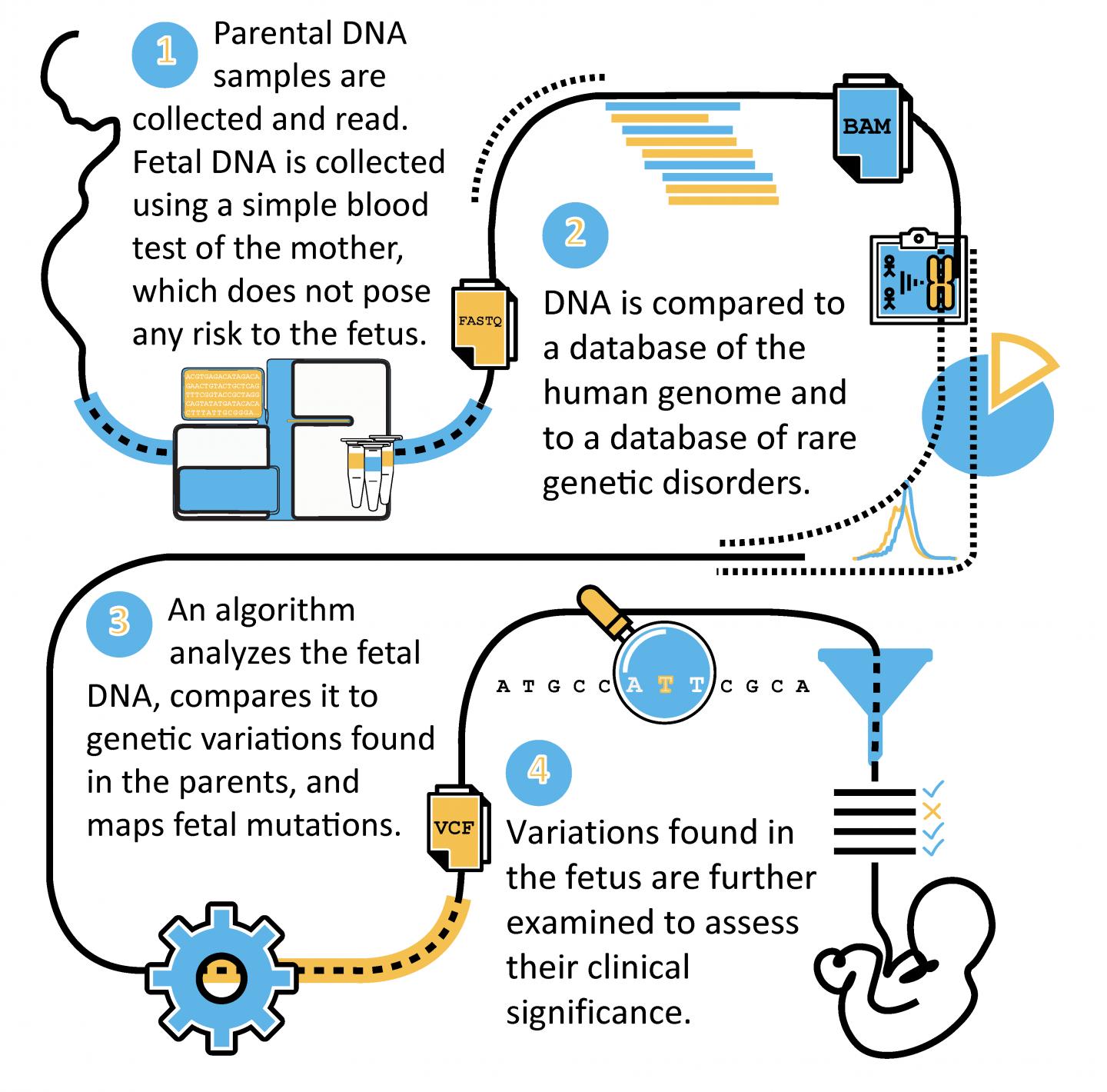Test could detect innumerable diseases caused by minuscule impairments in the fetal genome, Tel Aviv University researchers say

Credit: Tom Rabinowitz/AFTAU.
Tel Aviv University researchers have developed a new blood test for genetic disorders that may allow parents to learn about the health of their baby as early as 11 weeks into pregnancy.
The simple blood test lets doctors diagnose genetic disorders in fetuses early in pregnancy by sequencing small amounts of DNA in the mother’s and the father’s blood. A computer algorithm harnessing the results of the sequencing would then produce a “map” of the fetal genome, predicting mutations with 99% or better accuracy depending on the mutation type.
Prof. Noam Shomron of TAU’s Sackler School of Medicine led the research, which was conducted by TAU graduate student Tom Rabinowitz with Avital Polsky, Artem Danilevsky, Guy Shapira and Chen Raff, all from Prof. Shomron’s lab. The study is a collaboration with Dr. David Golan of the Technion-Israel Institute of Technology and Prof. Lina Basel-Salmon and Dr. Reut Tomashov-Matar of Rabin Medical Center. It was published on February 20 in the journal Genome Research.
“Noninvasive prenatal tests are already available for chromosome disorders such as Down syndrome,” Prof. Shomron says. “Our new procedure is based on fetal DNA fragments that circulate freely in maternal blood and bears only a minimal risk for the mother and fetus compared with such invasive techniques as the amniotic fluid test. We will now be able to identify numerous mutations and diseases in a safe and simple procedure available at the doctor’s office.
“The genetic mechanism behind Down syndrome affects a very large portion of the genome and therefore is easier to detect,” Prof. Shomron explains. “We performed upgraded noninvasive fetal genotyping, using a novel approach and an improved algorithm, to detect many other diseases that are caused by smaller parts of the genome. This is like looking at a map of the world and noticing not only that a continent is missing, but also that a single house is missing.
“The practical applications are endless: a single blood test that would detect a wide range of genetic diseases, such as Tay-Sachs disease, cystic fibrosis and many others.”
Prof. Shomron and colleagues tested blood samples from three families at Rabin Medical Center in the 11th week of gestation. They extracted maternal and paternal DNA from their white blood cells and fetal DNA from a placental cell sample. They also extracted circulating cell-free fetal DNA from the maternal blood.
“We sequenced all these DNA samples and created a computer algorithm that utilizes the parental DNA as well as the cell-free fetal DNA to reconstruct the fetal genome and predict mutations,” says Prof. Shomron. “We compared our predictions to the true fetal DNA originating from the placenta. Our model is the first to predict small inherited insertions and deletions. The method described can serve as a general framework for noninvasive prenatal diagnoses.”
The researchers are working on further improving the accuracy of the method and extending it to detect even more types of mutations.
###
American Friends of Tel Aviv University supports Israel’s most influential, comprehensive and sought-after center of higher learning, Tel Aviv University (TAU). TAU is recognized and celebrated internationally for creating an innovative, entrepreneurial culture on campus that generates inventions, startups and economic development in Israel. TAU is ranked ninth in the world, and first in Israel, for producing start-up founders of billion-dollar companies, an achievement that surpassed several Ivy League universities. To date, 2,500 US patents have been filed by Tel Aviv University researchers — ranking TAU #1 in Israel, #10 outside of the US and #43 in the world.
Media Contact
George Hunka
[email protected]
212-742-9070
Original Source
https:/
Related Journal Article
http://dx.




